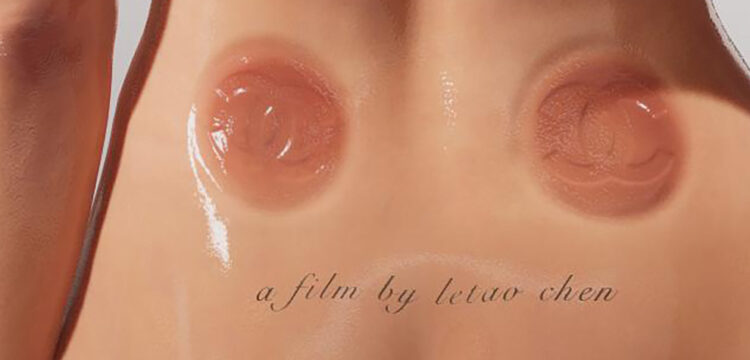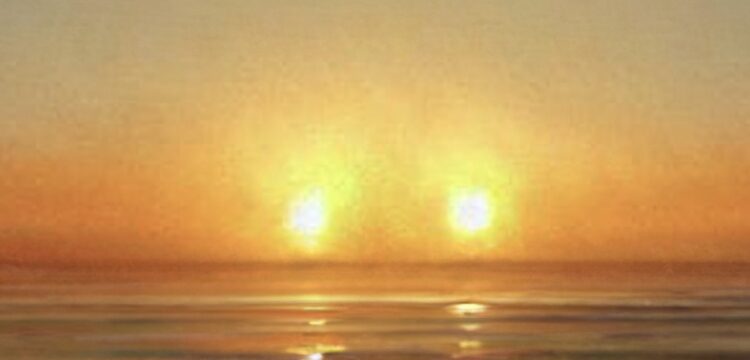LUNA.CORP
A conversation with Marco Salah El Din Tantawy
Mark William Lewis, Nina, New York, Organ Tapes, Rat Section—these are just a few of the names that have appeared on the lineups of luna.corp, a live music event series that has been running in Rome, and occasionally Milan, since last June. Organized by Marco Salah El Din Tantawy with the support of a few friends, luna.corp has taken a nomadic yet consistent form, traveling through small theaters and circoli Arci across Rome. Accompanied by DJ sets or live shows from local artists, with the series placing a strong emphasis on live performances.
I sat down with Marco to discuss the genesis of the project, its present state, and its future. Our conversation delved into the musical genres that luna.corp seeks to champion and the three cities that have shaped Marco’s journey—Rome, London, and Milan. Rome, at once disconnected from international music circuits and full of potential and interest for left of field electronic and live music. London, arguably the nerve center of this genre, serves as a breeding ground for sonic innovation. Milan, often the go-to destination for international artists touring Italy, but which sometimes appears saturated with design and aesthetics.
Self narration, or more precisely, an intentional lack thereof, plays a crucial role in the ephemeral genre luna.corp promotes. When artists choose not to fully disclose themselves, they leave space for the audience to construct their own interpretations, creating narratives that may diverge from the artists’ original intentions. Yet, this ambiguity given by lack of over-explanations allows the music to breathe, leaving space for it to grow and evolve. Events like luna.corp offer audiences the opportunity to build a more personal connection with artists who might not frequently perform in Rome. By bringing these live acts to the city, luna.corp nurtures an environment where music can be an embodied experience, fostering new possibilities for discovery and artistic evolution.
Marta Ceccarelli: What does luna.corp offer that was missing before?
Marco Salah El Din Tantawy: I’ve honestly never asked myself this question. I mean, I don’t know if what’s happening now is something that existed before or not—it’s not really important to me. What I’m trying to do is create an environment that, to me, feels kind of ideal. And when I say “me”, I always hope there will be a lot of people who share, more or less, similar tastes.
All I want is to have a cool place where the vibe is super friendly, where you can see new artistic proposals—“new” meaning coming from artists who either pass through Italy rarely or never come to Rome. The main hubs, the cities on tour lists are always somewhere else.
I want to reduce a bit of a gap that, in my opinion, still exists between Rome and the rest of Italy and Europe. I noticed it because I used to play in bands. If you’re an artist of any kind, if you play in Rome, you’re kind of outside of the national, European, and international circuits. And so, part of what I’m doing is to create a bit of a connection between a ton of different artists and give them a space to meet each other.
And also to give them an audience where they can present their work. It’s something that intrigued me from both the user side—as a visitor—and the artist side. Now, I mean, I’m not an artist, but I’ve always found myself kind of in the middle of these two dynamics. For the first time, I have the chance to see things from all angles, to fully own it from every perspective.
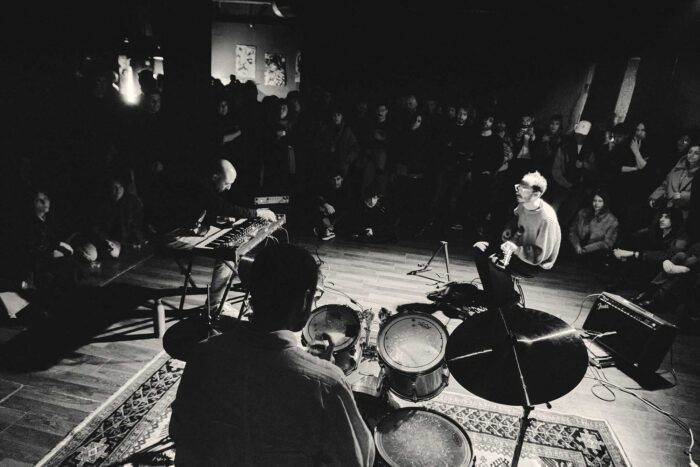
And speaking more about the physical space, not the imaginary one—you’ve held shows at Trenta Formiche, Pianeta Sonoro, and now, Teatro Lo Spazio. How is it to navigate these places, such as Circoli Arci? In Rome, there’s always the question of where to organize events, there’s no perfect space. What’s your take on that?
Yeah, it’s super difficult. First of all, I grew up in these places. I’m a true Roman, well, half Egyptian too, but I’ve always lived in Rome before moving to London. These are the places I used to hang out, so organizing events there just made sense. For me, these are the spaces of the city.
There are never enough spaces, and they’re definitely not perfect. But if I think about a first choice for organizing something, I always think of the “triangle” of Arci circles in and around Pigneto. These places are super inclusive and open to any proposal, even kind of blindly. They’ve never asked us, “What artist are you bringing?” or “What’s your intention?”—absolutely zero. The idea of moving around came up a bit as a way to experiment—how different spaces work with a certain type of artistic performance or audience. You get a mix—like, the old indie rock crowd from years ago, but also, I don’t know, a younger crowd that I didn’t know before. And I wanted to see how it all blends together.
I live and work in Milan, so I always say that for me, this is an excuse to come home and see my friends, but I haven’t really lived in the city for a long time. On one hand, that’s a problem because maybe I don’t understand some dynamics or know the audience I’m speaking to—well, not anymore, at least. But on the other hand, it’s kind of a strength because you go in without any preconceived ideas—just straight punk, doing exactly what you want. You don’t overthink it. Whoever shows up, shows up.
So yeah, it’s about activating a new space in the city, and also because I kind of grew up around there. It feels like being at home. With this latest series of events held at Teatro Lo Spazio, I’ve kind of found my space. It’s also great to bring to life to a relatively new venue that usually doesn’t host these kinds of events. Plus, I know there are already other groups and projects that are also bringing things to this space, which I think is a good sign. It’s also great because it’s a super modular theater, able to accommodate different types of performances.
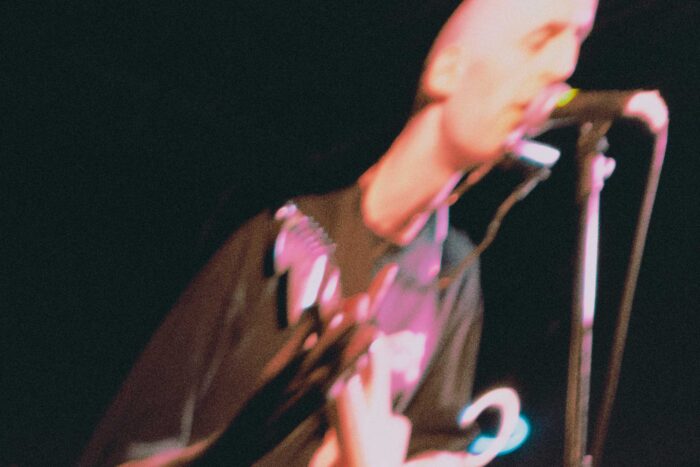
I do think that being somewhat outside of Rome’s dynamics can really help, because otherwise, things can get a bit stagnant. I notice it myself with my work, you end up with a lot of preconceived notions, or you overthink very specific and somewhat superficial dynamics. These things can slow you down and often don’t really matter. Maybe it’s better to keep some distance from some everyday Roman things. I say this as I only recently moved here and already my head is clouded by these things. But the city holds a lot of potential, and events like luna.corp underscore this.
I did realize how lucky I am to be an outsider. Of course, it bums me out when other interesting events are happening in Rome and I can only follow them from Instagram—I can’t really support them or give back to the city that’s giving me so much. That does bother me, and I’m trying more and more to come back more regularly.
Is luna.corp a solo project or is there a team?
Obviously nothing would exist without the support of friends. We are actually a small team. For events, more friends jump in to help out on the night. We’re super agile because we are a small team and we understand each other perfectly.
Regarding collaborations, we’re pretty open to everything. But I think there’s still a bit of confusion, not everyone understands what luna.corp is. For now, since I’m keeping things pretty low-key, not in a rush to do anything big, I’d rather take things slow. Not because there’s no room for collaboration with other groups, but because I still need to properly start this thing. You can’t collaborate with something that’s still so ephemeral.
I’m sure it doesn’t only happen in Rome, but sometimes there’s a fear of not getting enough attention, and a tendency to correct that by latching on to other projects. So you might end up with these clusters and mixes that don’t always work, or you lose a bit of the guiding thread. With a project like luna.corp, I can feel a sense of curation, there’s a scene and world it references and evokes that’s not strictly-defined but still fluid. This is both in aesthetics and communication, but most importantly in the musical choices and the audience that it gathers. So it makes sense to do your own thing, maintaining the uniqueness of the project.
Yeah, exactly. I don’t really have big ambitions in terms of branding or anything like that. I mean, I don’t even push for our name to be on event posters. Like, when artists announce their tour dates and they get to Rome, I don’t ask them to put luna.corp’s name anywhere. I don’t impose anything. I’m not sure if it’s the “right” approach—I’m not even asking myself that question. I just like it this way. I work in communications, so I spend all day thinking about these strategies. Now that I have my own thing, I want to do the exact opposite of what I do at work. Otherwise, I’m not really having fun.
You can look great on Instagram, and then nobody shows up, or the people who do come don’t enjoy being there.
People who haven’t even been to any of our events because they’re not from Rome, compliment my Instagram page, without having experienced the events themselves.
Operating between Rome and Milan, how do you experience those two cities in relation to music events? On a superficial level I feel like Rome can be quite amateur, at least in terms of aesthetics or design. Maybe Milan is kind of the opposite—it’s almost over-designed. Your IG presence strikes a good balance.
In Milan sometimes there’s not much substance, but the posters look amazing. But I like navigating the two cities. New York played in Milan in this really nice space called Cane Cane Studio. It’s an artist’s studio, not a venue that usually hosts concerts. It was kind of an experiment, as it was the first time they hosted international artists. We’re doing something together again for Nina’s show. But it’s still kind of underground, it’s all very DIY. Luckily, in Milan, word of mouth spreads a bit faster, so you don’t have to push it too hard. It’s a collaboration with those guys that I’ll definitely continue in other forms. One of them will even play on March 1st before Nova Varnrable, Andrea Tortora, he will do an ambient noise set to open.
Speaking of artists, you can definitely sense the connection with the London music scene. It seems natural that you gravitate toward artists who, even if they’re not from there, have more visibility or relevance there than here.
Yeah, I mean, that’s definitely influenced by my past in London. Over there, all these projects, even if they seem new, have been around for years. So I had the chance to see them there before.Now is a good time to showcase them, because they’re a bit more known but haven’t really left the UK yet. Plus, they match my taste, so I’ve kind of embraced all of that. It’s also simply because it’s the scene I know best since I’ve lived it. But of course I’m looking beyond that, like with the next act, Nova Varnrable, who is related to the London scene but is based in Copenhagen, which has a great and active scene at the moment.
How would you define the kind of music played at luna.corp?
The focus is always live music.There are DJ sets closing the party, but that hasn’t really taken off yet. The audience comes for the live show and stays for it. Whether the night ends at 2 a.m. or 5 a.m., I don’t see much of a push to keep the party going.
I’m not sure how to define it. A lot of people describe it as a new indie rock scene with some more artsy or experimental traits. That said, there isn’t really a set genre, because I like to expand it to more diverse artistic expressions. Right now, it’s just stuff that matches my taste, and I have the chance to bring it here through connections and logistics.
Basically, it’s just an excuse to listen to your favorite artists.
Yeah, exactly. How would you define it?
So, it definitely has an element of returning to acoustic or instrumental music. I remember when Organ Tapes released his 2022 seminal album 唱着那无人问津的歌谣(Chang Zhe Na Wu Ren Wen Jin De Ge Yao), it felt like it signaled a vibe switch. It was much more acoustic than his previous releases. Someone had described it as “digital folk music.” So there’s this element of reference to the digital, a contemporary element is always integrated, both in terms of lyrics and in terms of sounds. But there is an interest towards the lived experiences, a return to the offline. If genres like hyperpop push or relationship with digitalization to the extreme, this scene tries to remove themselves from that.
I also like a definition which was used to describe James K’s music, which is proximal to this scene but maybe more in the experimental electronic leftfield world. Someone described her genre as the “clubby corner of the ambient music scene,” playing with these long, slow sounds with rhythmic elements. And then there’s New York, which deserves a category of its own, in my opinion. It’s so hard to describe. To me, their first album, No Sleep Till N.Y., was really kind of a turning point.
New York has a self-perception that was totally different from what any blog or music media wrote. Sometimes they get clustered with the Indie Sleaze revival, which feels misdirected because they weren’t around when that thing existed in its first iterations. Everything is cyclical and new generations reinterpret the past in their own ways—sometimes totally by chance. I don’t think they are worried about this, but I wonder if by being more public this interpretation of their work would change.
There’s also this trend, especially among all the artists I’ve been following, of not giving interviews, sharing very little information about their musical or artistic background. And on the one hand, it can be cool because it creates this sort of aura of mystery around them. But on the other hand you’re asking the audience to make an effort.
Yeah, the audience ends up drawing their own conclusions, with ideas that might not reflect reality. Whether you share information or not, they’ll still create a narrative around you.
You know, this often happens to me when I talk about Bar Italia. I’ve always heard the most different, varied opinions. What fascinates me is how they enact a bit of a farce, you know? They play the role of a chart-topping rock band, you know, like NME magazine in 2007. Some people take that at face value, and ask themselves “How did they achieve this success? They don’t know how to play, the songs don’t make sense.”
Bar Italia is a controversial one. I’ve never managed to go to any of their concerts. But I remember my friends’ faces, after one of their first shows, they were all like, “I hate them, terrible, they came on, ignored the crowd, they were super rude.” And then on the other extreme end of the spectrum, I met someone in New York who was super into them and became a sort of groupie, going to all of Bar Italia’s shows, really trying to fit into a detached, cool, snobby image. And you think, of course he likes Bar Italia, because he wants to give a certain impression of himself. All these narratives inevitably develop and then they contribute to a certain image out of the control of the artists themselves.
Yes, and this confusion that exists in placing artists in a genre, is precisely what is important which helps in focussing on the music itself.
I think Gen Z, which I am sort of part of, feels the weight of past generations and contexts because we’re always told that everything is recycled, everything references the past. It’s almost difficult to find things that feel truly modern. Of course, even with New York, I understand that some might associate them with the Indie Sleaze Revival, but in terms of sound and approach, it feels so much fresher and more innovative.
Yes, and it seems like this whole scene, these artists we’ve mentioned, are so full of references, revivals, etc., that it almost comes full circle. It’s such a compilation of things that it becomes something entirely new, something that has never been heard before.
I’ve experienced this with Dean Blunt. He would use these big 90s indie rock sounds, and layer spoken word, and melodic singing, and I had no idea where it was going. It’s having too many references and then having none at all, and that’s something that really excited me. It still excites me a lot.
Yeah, because when you have so many possible references and influences from the past, it gets chewed up, recycled, and loses context. The real connections may disappear, and new, fictional connections are made. New stories and myths are created, even if they did not really exist in those forms, but they still turn into something new.
You reminded me of something when you were talking about how some people don’t want to be interviewed. For example, Voice Actor, who did her first interview ever with Shawn Reynaldo. The interview was great. Getting to know more about her develops a closer relationship to her music, but it also takes away some of the magic of her work. She wasn’t hiding her identity per se, the mystery around who she was increased the allure of the sonic experience. There’s this magical world created with music that, in a way, makes artists lose something when they reveal themselves. But at the same time they also gain a human aspect. Even in this music that’s so evocative, like the genres we have talked about, we usually listen to it in a mediated form, on Spotify with AirPods. When you see them live, or get to know them better, when they’re close to us, maybe the magic isn’t lost, but it changes. You have a different relationship with it.
Yes exactly. Also there are some artists who, within this low key scene, breakthrough with the Spotify algorithm. Voice Actor, I think, is one of them. Mark William Lewis has had the same effect on me as what you just said—the change from the album to the live performance, even though it’s the exact same thing, it’s completely different. You experience two completely different emotions. And I think this can be disappointing if you don’t have the tools to face it or understand it. I hope that everyone who went to the luna.corp show when he played wasn’t disappointed by the artist themselves. The nice thing is that these events are attracting an audience that, I think, has those tools to understand this difference. I see a nice, attentive audience, and that’s thanks to the music of these artists, not the event or the promoter, or me. It’s cheesy, but it’s the music that matters in the end.
I remember one of the first luna.corp I went to, the one with Organ Tapes, I thought, why are there so few people coming to see Organ Tapes? But little by little, a following grew behind the events. For the kinds of names you’re bringing and the type of music, I think a lot of cities would gather a larger audience. Do you have this feeling of wanting more people to appreciate what luna.corp offers?
That’s something I’ve been trying to build a little bit over time. Obviously, yeah, like every event organizer—even though I don’t like that word too much—you need to work on making an event sustainable and sell tickets. But I’ve never felt that pressure, mainly because, fortunately, I’ve always been able to break even. I think this is slowly building, and it will still take time. At the last event, I think there were even almost too many people. I don’t know what the perfect number is, but this isn’t something that worries me. I always hope that the context is right for the event, and that’s what matters, the quality of the audience. The best part of all these events has been how the people connected, both the artists and the audience.
It still feels very intimate, on a more personal level.
Yeah, well, because it should be like that. The thing is simpler, really. If you want more people, you just book a bigger artist. I wouldn’t want to do that. I just want to create a community of people who are into this and always find each other at these events. They don’t have to come every time. If they did, it’d be a bit of a hassle, right?
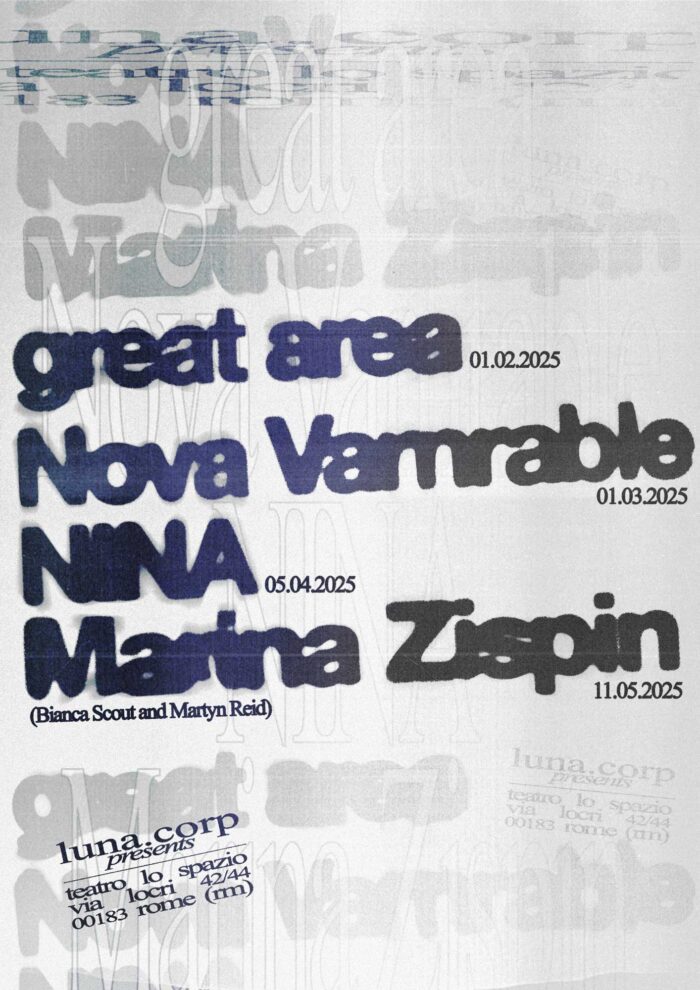
Also I kind of started with the assumption people might have the chance to see these artists again in other events, or festivals. So for me it’s about the context I am building with each event, I want it to feel right. I want people to find everything: from the artistic proposal to communication, to the people who come, and the spaces we’re using in a less traditional way. And little by little, if people get this, I’ll be happy.
The next events will be held every month at Teatro Lo Spazio. We kicked off the program with great area and her relaxing records and proper synth-pop peaches coming from London’s fuzzy underbelly. Nova Varnrable is bringing work which spans techno, soul and experimentalism. There’s also going to be a show by Italian-born and London-based artist and songwriter Nina, frontwoman of Bar Italia, and Marina Zispin, a project by Bianca Scout and musician Martyn Reid embodying the negative space between dance, music, and performance. The tickets can be bought here.
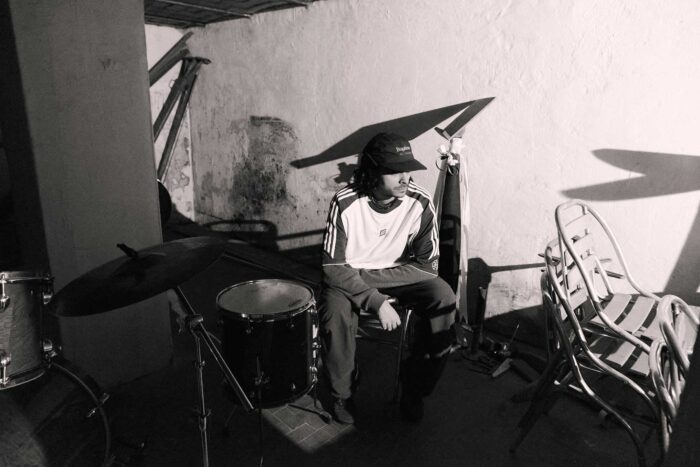
One final thing I want to ask you is, three albums that somehow feel relevant to the story of luna.corp?
Forever dreaming – corporate finance, Spring is coming with a strawberry in the mouth/rapid eye movements – operating theatre and everything from julius eastman.


